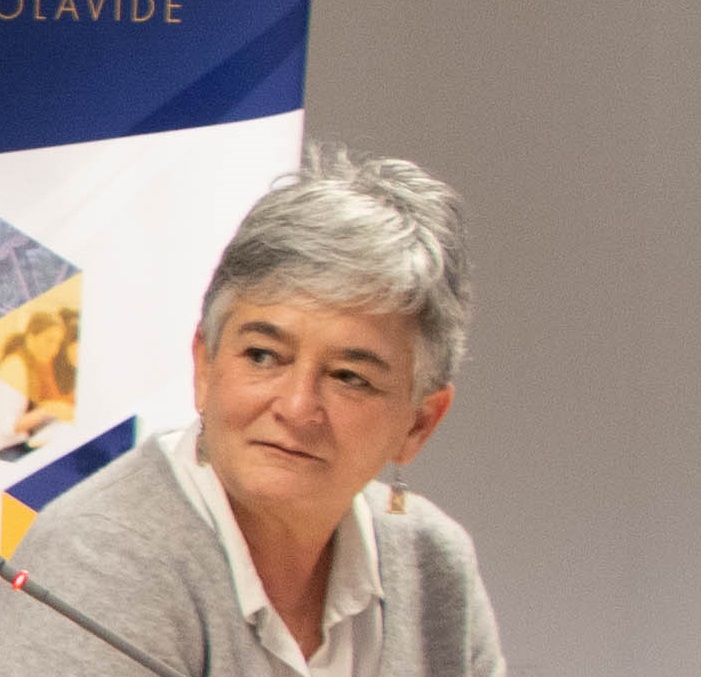Master's Degree
High-Performance Stadium Architecture & Design UPO – AYESA (HiPSAD)
I Ed.
Why choose this Specialized Degree at Universidad Pablo de Olavide?
Sports stadium architecture has evolved significantly in recent decades, becoming a highly specialized discipline that combines architectural design, structural engineering, sustainability, user experience, and urban management.
In light of this context, the HiPSAD Master’s meets an increasingly evident academic and professional need: to train experts capable of designing stadiums that are not only architectural landmarks, but also efficient infrastructures, technologically advanced, and culturally significant.
References such as Madrid’s Santiago Bernabéu Stadium, or the active participation of firms like Populous, Gensler, Zaha Hadid or Cruz y Ortiz in the design of world-class stadiums, demonstrate the growing academic and industrial interest in this type of infrastructure.
The construction of stadiums such as the Estadio de la Cartuja (Seville), Dammam Stadium (Saudi Arabia) or the Lusail Stadium (Qatar) has not only entailed major technical and logistical challenges, but also a profound reflection on the relationship between architecture, sport, spectacle and the city.
This Master’s program aims to establish itself as a benchmark in Europe for architects and engineers wishing to specialize in high-performance stadium design. Through a multidisciplinary approach, the program provides the necessary tools to understand the technical, regulatory and conceptual processes behind these mega-infrastructures, with a global outlook and an orientation toward innovation.
Collaborating Entities
Salidas profesionales
Who is it for?
The HiPSAD Master’s Degree is aimed at professionals and university graduates in the fields of architecture, civil engineering, building construction, and infrastructure management who wish to acquire highly specialized training in the design, planning, construction, operation, and maintenance of large high-performance sports facilities such as stadiums, multifunctional arenas, and state-of-the-art sports centers.
This program responds to the growing international demand for specialists capable of addressing the technical, functional, and environmental challenges involved in developing large-scale sports infrastructures — projects that require not only design excellence, but also the ability to integrate aspects related to structural safety, energy efficiency, urban mobility, user comfort, and long-term profitability.
The Master’s is designed for:
Young architects and engineers who have recently graduated and wish to enhance their professional profile with specialized training in an expanding market niche.
Active professionals working in architectural firms, engineering consultancies, or technical departments of construction and development companies who want to acquire advanced, up-to-date knowledge of international methodologies, tools, and standards applicable to stadiums and sports venues.
Public administration technicians or representatives of sports institutions involved in the planning and management of large-scale urban sports facilities.
In addition, the program will attract candidates with a strong interest in technological innovation, urban sustainability, and the social impact of design, as well as those interested in working in collaborative, multidisciplinary environments. The Master’s approach promotes employability within international architecture and engineering firms, major construction companies, specialized sports facility enterprises, and organizations linked to professional and elite sports.
Developed in collaboration with AYESA, a leading group in infrastructure engineering and architecture, the program aligns with the real needs of the industry, incorporating practical case studies, professional software, and parametric and digital design methodologies applied to high-impact projects.
Ultimately, the HiPSAD Master’s stands as a unique academic program at the international level, ideal for those seeking to acquire a highly qualified technical profile, with skills adapted to emerging trends in sports architecture, smart stadiums, and urban regeneration through sport.
Dirección del título

Dña. Macarena Hernández Ramírez
Academic Director
Associate Professor, Department of Social Anthropology, Basic Psychology and Public Health, Universidad Pablo de Olavide

D. Carlos Francisco Lucena González
Executive Director
Architect, BIM Consultant. ACI (Autodesk Certified Instructor)

Dña. Macarena Tejada Tejada
Quality Assurance Manager
Associate Professor, Department of Geography, History and Philosophy, Universidad Pablo de Olavide
Study Plan
The program will only be launched if the minimum required number of enrollments is reached in each case.
Program Courses
Module I: History and Typologies of Sports Stadiums – 10 ECTS
Module II: Stadium Design and Technology (I) – 13 ECTS
Module III: Stadium Design and Technology (II) – 11 ECTS
Module IV: Functional Planning and User Experience (UX) – 5 ECTS
Module V: Project Management and Construction Execution – 15 ECTS
Master’s Final Project – 6 ECTS
Faculty
D. Fernando Andrés Pérez
Architect and PhD in Physical Activity and Sports Sciences. ARQUISPORT.
D. Francisco José González de Canales Ruiz
Full Professor of Architectural Composition at the University of Seville. Canales Lombardero Architects.
Dña. Tayomara Gama
MAPM Architect, Regional Sports Leader Europe. Gensler.
D. Juan Manuel Rojas Fernández
PhD Architect. Director of Hombre de Piedra Arquitectos.
D. Ignacio Hinojosa Sánchez-Barbudo
PhD ICCP. Director, Transport & Cities. AYESA.
D. Óscar Liébana Carrasco
PhD Architect. Universidad Politécnica de Madrid and FCC.
D. Jaime Aguilar Valseca
Architect. Nfoque Arquitectura SLP.
D. José Luis Ponz Tienda
PhD Architect. PLEXOS Project.
D. Carlos Quevedo Rojas
PhD Architect. Carquero Arquitectura.
D. Enrique Vázquez Vicente
PhD Architect. Professor at ETS de Arquitectura. Director of the FabLab of Seville.
D. Fernando Medina Encina
PhD Civil Engineer. Associate Professor at the University of Seville. Director of the Structural Concrete Area.
Dña. Eva García Pascual
Architect. Project Director, Buildings & Cities Division. AYESA.
D. Miguel Ángel Pontijas Calderón
Architect. Technical Director of Building and Cities. AYESA.
D. Sergio Mota de la Hoz
Architect. Senior Project Director. AYESA.
D. José Ortiz Acosta
Architect. 360 BUILDINGS (360 Transformation Group SL).
D. Alberto Fajardo López
Industrial Engineer. Technical Director of Facilities, Senior MEP Manager Santiago Bernabéu Stadium. AYESA.
D. Carlos López-Palanco Díaz
ICCP. Senior Project Manager Santiago Bernabéu Stadium. AYESA.
D. Daniel Herrera Calle
Architect. Director of the Building and Cities Division Spain, Site Director Santiago Bernabéu Stadium. AYESA.
D. Benjamín Frías Núñez
Architect. Site Management Santiago Bernabéu Stadium. AYESA.
D. Antonio Cubero Hernández
Architect. Director of Buildings & Cities Division. AYESA.
D. Salvador Conradi Galnares
Industrial Engineer. Senior MEP Manager Dammam Stadium. AYESA.
D. Antonio González Liñán
Architect. SV60 Cordón & Liñán Arquitectos.
D. Fernando Andrés Puerto
Architect. ARQUISPORT.
D. Carlos Lucena González
Architect. RF AECO Competence Center.
D. Juan Carlos Venegas del Valle
Architect. BIM Manager, BNAMICS.
D. Bernardino Morillo Merino
Architect. BIM Consultant and Energy Consultant. Authorized Trainer by CYPE Ingenieros.
D. David de Cos Román
Architect. Cruz y Ortiz Arquitectos.
D. Manuel García Navas
Technical Architect and Building Engineer.
Final Project
The Master’s Final Project represents the integrative conclusion of the program and provides an opportunity for students to demonstrate, individually, their ability to tackle a complex stadium architecture and engineering project from a multidisciplinary, technical, and conceptual perspective.
The MFP will involve the development of a research-based proposal focused on a high-performance stadium located in a real context, adhering to the highest international standards in terms of design, sustainability, regulations, and user experience. Students will be expected to address the MFP by analyzing all aspects: from architectural conception to structural and construction resolution, incorporating digital tools such as BIM modeling, flow analysis, bioclimatic strategies, and parametric design.
Each student will be assigned one or more specialized tutors to guide them throughout the process. The work will culminate in a public presentation and defense of the project before a panel composed of industry professionals and academics, where evaluation will consider not only the technical quality of the work but also innovation, feasibility, coherence, and the student’s communication skills. The MFP is intended to serve as a professional showcase for accessing leading studios and companies internationally.
The objective of the Master’s Final Project is to integrate, apply, and practically demonstrate the knowledge, skills, and competencies acquired throughout the program. The MFP will consist of developing a research project related to one of the aspects covered in the Master’s program, focused on a stadium project defined by the student.
Each student will have an academic tutor, and in the case of projects linked to companies or collaborating institutions, a professional tutor will also guide them in the technical and organizational development of the project.
Assessment System
The Master’s Final Project will be defended before a panel composed of industry professionals and program faculty.
Credits assigned to the final project: 6 ECTS
Internships
Although the Master’s program does not include mandatory external internships, students who wish to participate may join the various internship programs available for both current students and graduates, managed by the Universidad Pablo de Olavide Foundation.
Several of the collaborating companies offer optional paid extracurricular internships for professional development. Participation in these internships is voluntary for students who wish to take part.
Methodology and Assessment
The HiPSAD Master’s program will be conducted through a face-to-face, active, and applied learning methodology, combining theoretical classes with practical workshops, critical sessions, technical visits, and multidisciplinary team work. Weekly in-person sessions will allow for direct and continuous interaction between faculty and students, promoting debate, idea exchange, and personalized guidance in project development.
One of the key methodologies will be Project-Based Learning (PBL). Students will progressively develop a complete high-performance stadium project, applying the knowledge acquired in the different courses of the Master’s program: architectural design, structural engineering, regulations, sustainability, user experience, and BIM technology. This approach will allow students to experience a process similar to professional practice, facing real challenges and complex design decisions.
Additionally, the case study methodology will be used, analyzing emblematic examples of contemporary stadiums through technical documentation, plans, virtual or in-person visits, and presentations by invited experts. This will enable a deep understanding of the construction, functional, and aesthetic strategies employed in internationally recognized projects.
The program will also include intensive workshops with internationally renowned professionals, where students will work in teams to solve design challenges within limited timeframes, fostering creativity, technical agility, and collaborative decision-making.
Furthermore, there will be a strong emphasis on the use of advanced digital tools (such as BIM, energy simulation, and parametric modeling), combining technical training sessions with direct application in student projects.
The Master’s will be delivered in a hybrid format, combining in-person classes with one weekly online session. Students unable to attend in person may follow the classes via streaming.
Assessment
Assessment will be continuous and formative, based on partial submissions, public presentations, and critical defense of projects before an academic-professional panel.
The evaluation will be calculated according to the following percentages:
- Attendance: 50%
- Theoretical tests: 10%
- Final Project: 30%
Admission Requirements and Profile
The following candidates may apply for the Permanent Training Master’s studies:
- Holders of a Spanish undergraduate degree (Grado) or its equivalent.
- Holders of a degree issued by a higher education institution within the European Higher Education Area (EHEA), which grants access to official postgraduate studies.
- Holders of a degree from an educational system outside the EHEA, which certifies a level of training equivalent to the corresponding official Spanish undergraduate degree (Grado) and provides, in the country issuing the degree, access to postgraduate studies.*
- Candidates who have completed at least 180 ECTS credits corresponding to official undergraduate studies. In this case, to obtain the Master’s degree, the student must have completed their undergraduate studies before the Master’s program concludes.
- Exceptionally, candidates with demonstrable professional experience in a field related to the content of the program. Admission under this category is subject to authorization by the Postgraduate Commission of Universidad Pablo de Olavide.
* It is not necessary for these degrees to be officially recognized in Spain.
Schedule
This Master’s program will run from November 4, 2025, to September 30, 2026. Both in-person and online classes will be held from 4:15 PM to 8:00 PM.
Classrooms will be assigned once the number of enrolled students is confirmed, and students will be notified by email prior to the start of the program.
Fees and Financial Information
Tuition Fees: €6,400.20
- This amount does not include the degree issuance fees; information can be accessed via the following link.
- This amount does not include the student ID card issuance fees; information can be accessed via the following link.
Payment Schedule
- Reservation of Place: €500.00
- Enrollment Fee (once admission has been communicated and before the program begins): €2,950.10
- First Installment (January 2026): €1,475.05
- Second Installment (March 2026): €1,475.00
Please note that installment payments do not exempt students from paying the full tuition once the program has started. Information regarding the conditions for refund of the Reservation Fee can be found here.
Financial Aid
All Specialized Degree programs (Títulos Propios) offer the possibility of applying for financial aid. Complete information and the application deadlines can be found here.
Questions? Contact Us
For academic information:
For administrative information:
Área de Títulos Propios
Tel: +34 954348963 / +34 954349066
titulospropios@fundacion.upo.es
Quality Certification – AENOR ISO 9001
The Fundación Universidad Pablo de Olavide, has been committed to quality management since 2003, the year in which its Quality Management System was first certified. Since then, the Foundation has pursued a process of continuous improvement, allowing the evolution of its management system to meet new operational challenges, always in accordance with the quality standards established by ISO norms.
The scope of the Foundation’s Quality Certificate covers the management of External Academic Internships (both Curricular and Extracurricular) and the management of Continuing Education (Specialized Degrees – Títulos Propios – and Microcredentials).
Teaching Method
Hybrid
Course Start Date
04/11/2025
Academic Calendar
Credits
60 ECTS
Tuition Fees
6.400,20 €
Modalidad
Híbrida
Créditos
60 ECTS
Precio del curso
6.400,20
Para consultar la información completa de este Título Propio, por favor visite esta web en un ordenador de escritorio.














